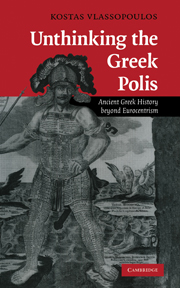Book contents
- Frontmatter
- Contents
- Acknowledgements
- Abbreviations
- Introduction
- PART I DEFINING THE CONTEXTS OF THINKING ABOUT THE POLIS
- 1 An archaeology of discourses
- 2 The ancient discourses on the polis
- 3 Making use of Aristotle: concepts and models
- PART II RETHINKING THE CONTEXTS. THE POLIS AS AN ENTITY: A CRITIQUE
- PART III BEYOND THE POLIS: THE POLIS AS PART OF A SYSTÈME-MONDE
- References
- Index
3 - Making use of Aristotle: concepts and models
Published online by Cambridge University Press: 22 September 2009
- Frontmatter
- Contents
- Acknowledgements
- Abbreviations
- Introduction
- PART I DEFINING THE CONTEXTS OF THINKING ABOUT THE POLIS
- 1 An archaeology of discourses
- 2 The ancient discourses on the polis
- 3 Making use of Aristotle: concepts and models
- PART II RETHINKING THE CONTEXTS. THE POLIS AS AN ENTITY: A CRITIQUE
- PART III BEYOND THE POLIS: THE POLIS AS PART OF A SYSTÈME-MONDE
- References
- Index
Summary
The Aristotelian treatment of the polis has been sketched above. It is now time to put a number of questions and arrive at a number of conclusions that will provide our guidelines for the rest of this study. The problem with the modern scholarship on the polis is that it has discarded the binary use of the term by the Greeks, in order to arrive at a single, ‘essentialist’ or ideal-type definition of the polis. In doing this, it has been forced to disregard most of the ancient uses of the term to describe particular historical communities, because those uses do not fit with what the polis ‘ought to be’, according to the preferred definition; on the other hand, the nature of the political discourse of the ancient Greeks on the polis has often been misrepresented and its main insights ignored. Accordingly, our task is to argue for a novel study of the Greek poleis by paying new attention to both the Greek contexts of using the term. In this final chapter of the first part I try to abstract some basic concepts, models and insights from the political discourse of the Greeks. These basic concepts and models will be used in the coming chapters, in order to review and think again about the vast number of different historical Greek poleis.
- Type
- Chapter
- Information
- Unthinking the Greek PolisAncient Greek History beyond Eurocentrism, pp. 85 - 96Publisher: Cambridge University PressPrint publication year: 2007



